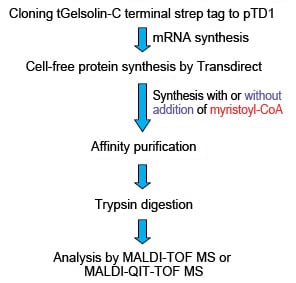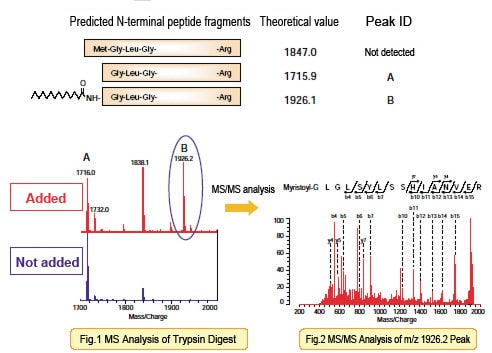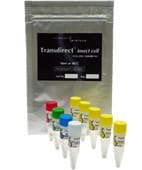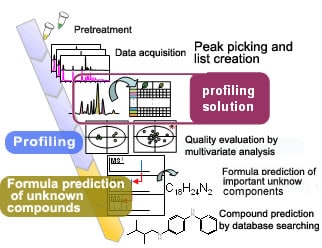Post-Translational Modification Analysis | Analysis of Synthetic Protein N-terminal Modification by Mass Spectrometry
Post-Translational Modification Analysis
Analysis of Synthetic Protein N-terminal Modification by Mass Spectrometry
The importance of protein post-translational modification analysis has heightened in recent years. The type of modification can be predicted to some degree from the amino acid sequence, but in practice testing is required for proof.
An easy modification analysis method using Transdirect insect cell (Cell-Free Protein Synthesis Kit) in combination with a MALDI-TOF mass spectrometer is introduced below.
N-myristoylation analysis : Protein N-myristoylation refers to the modification reaction that transfers myristate, a 14-carbon saturated fatty acid, to the glycine reside of the newly exposed N-terminal following removal of the initiator methionine. This modification has been recognized in many proteins involved in cell information transmission. It is known to play an extremely important role in binding to membranes and in protein-protein interactions. We analyzed tGelsolin in which N-myristoylation is known to occur as the model protein.
■ Test Flow

■ Results
The addition of myristoyl-CoA as a substrate for the modification reaction resulted in the detection of the m/z 1926.2 peptide fragment thought to result from N-myristoylation (Fig. 1). MS/MS analysis identified this peak as an N-terminal peptide fragment containing the myristoyl group (Fig. 2).
The same method can be applied to analyze N-acetylation and initiator methionine removal.

The results above show that Transdirect has the ability to cause the typical protein modifications occurring at the N-terminal. In combination with a mass spectrometer, it can be seen that this method provides a powerful tool for N-terminal modification analysis.
* These are the results of joint research conducted with Prof. Toshihiko Utsumi, Yamaguchi University Graduate School of Medicine.
Transdirect insect cell (Cell-Free Protein Synthesis Kit)

This is a new cell-free protein synthesis kit derived from insect cell cultures. It achieves superior protein synthesis capacity to a rabbit reticulocyte lasate system. The kit comes with optimized reaction buffers and expression vectors to allow optimal protein synthesis tests to be easily conducted.
MALDI-TOF Mass Spectrometry

- Employs unique quadrupole ion trap technology for highly sensitive and accurate MSn spectral measurements of the molecular ions produced by MALDI.
- The high precursor ion selectivity offers reliable selection of the target ions only, even in the presence of large numbers of impurity ions, to permit acquisition of high-quality MSn analysis data.
- Offers highly accurate MSn analysis data that allows accurate structural prediction.
- Analysis software provides powerful support for glycopeptide structural analysis.


